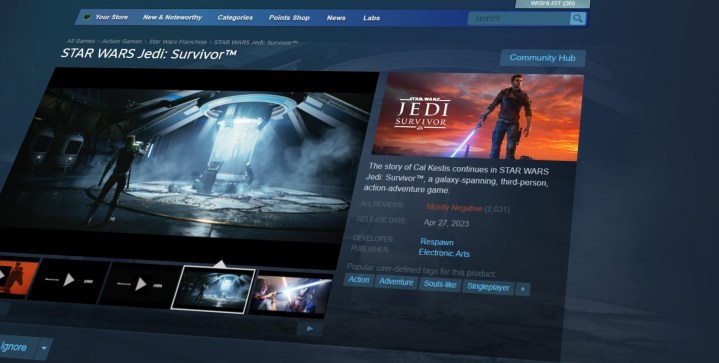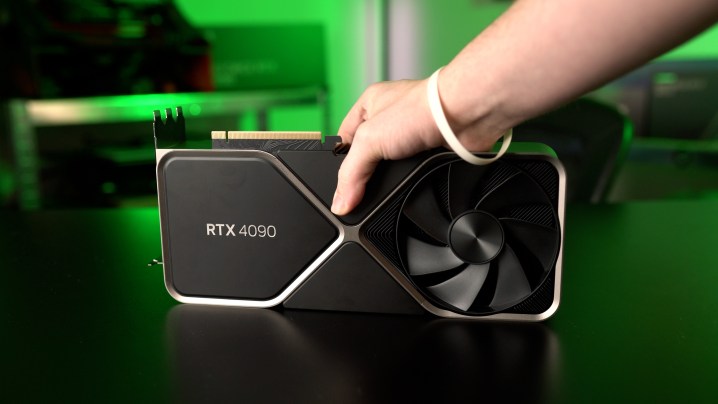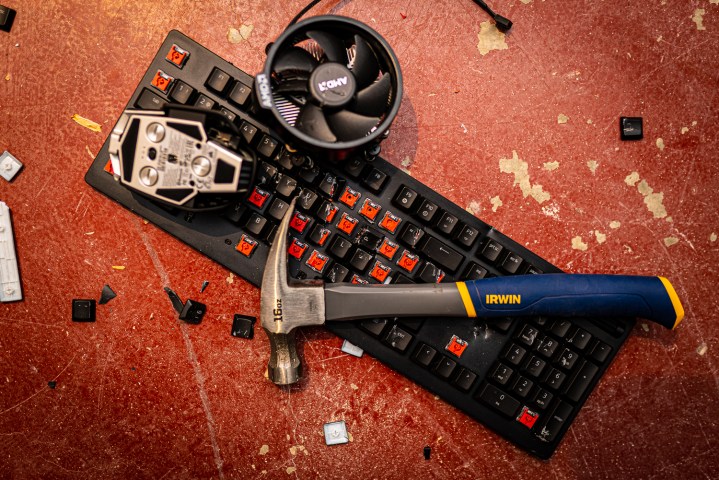“PC or console?” It’s a question I get from friends often, especially when a big cross-platform game launches. Most recently, it arose when a friend asked about Star Wars Jedi: Survivor.
To my own surprise, I pointed him in the direction of his television, not his desktop. And the same has been true with other flagship games released this year, including Hogwarts Legacy and The Last of Us Part 1.
I consider suffering through stutters and crashes in new games just an occupational hazard, of course. But if I was just playing games and not testing their performance, I know I’d be more inclined to spend my $70 on a platform where I know the game will at least run. That’s more than I can say for most new PC games these days.
The worst it’s been in a while

Wind back to 2015 when Arkham Knight‘s infamous PC port released. In the years leading up to it, there had been a bit of a renaissance is PC ports. Publishers were willing to devote more time to PC as a platform, leading to better graphics menus, more control options, and the death of dreaded mouse acceleration. Then Arkham Knight happened. A capped frame rate, horrid performance, and constant stuttering made it one of the worst PC ports ever released. And in 2023, it feels like we’ve been getting an Arkham Knight at least once a month.
Basically, every AAA release on PC this year has been littered with problems. There have been disasters in the form of The Last of Us Part 1, Wild Hearts, and Star Wars Jedi: Survivor, but even Returnal, Resident Evil 4, Hogwarts Legacy, Forspoken, Redfall, and Dead Space have seen issues to varying degrees. That’s every AAA release that’s been released so far in 2023, short of Atomic Heart and Hi-Fi Rush.
It’s getting hard to trust that a new game will run at all on PC. At the very least, it’s becoming an expectation that you’ll encounter a few performance issues.
There have been echoes of this in the past few years. Last year, Gotham Knights and Elden Ring both suffered shader compilation stuttering, and Resident Evil Village exhibited massive frame rate slowdowns due to its digital rights management (DRM) at launch. But if you look at the other games released in the past two years — Dying Light 2 Stay Human, Hitman 3, and Forza Horizon 5, to name a few — they launched relatively free of performance problems on PC.
That’s not to mention other, non-performance issues with PC ports. Redfall‘s UI breaks if you set your abilities to mouse buttons, for example, and everything from Star Wars Jedi: Fallen Order to Marvel’s Midnight Suns requires multiple launchers to get running (and sometimes those launchers further hurt performance). You can look at the large swath of indie releases coming to Steam every week and devices like the Steam Deck and ROG Ally and say that PC gaming has never been better. But when it comes time to play a major AAA release, which is the main driving force behind having a solid gaming PC in the first place, you’re forced to compromise, even on high-end hardware.

It’s hard to say exactly why games are launching the way they are now. Perhaps there are lingering development kinks from the pandemic. Maybe it’s developers struggling to wrangle technical debt in engines built for the previous generation while driving next-gen features. Or maybe it’s accelerated development cycles. Star Wars Jedi: Survivor, for example, was developed in roughly three years. Fallen Order, its predecessor which has a much more narrow scope, took five years. It could be any of these things, or none of them. I don’t know. I’m not a game developer.
I just know the results, and those results have been disappointing in 2023. They also come amid the backdrop of PCs getting more expensive to build and upgrade to enable features that many of these games need to run stably. That leaves a lot of otherwise powerful PCs behind without any easy upgrade path.
Expensive upgrades

As someone who reviews graphics cards for a living, I’ve been seeing this trend for close to a year, but it really became clear with Hogwarts Legacy. The game carries two problems on PC: high VRAM usage and a CPU bottleneck.
Let’s start with VRAM usage. The game consumes upwards of 15GB of VRAM at 4K with ray tracing turned on. What’s worse is that it consumes nearly 10GB at 1080p with ray tracing turned off. If you bought an RTX 3080 10GB, which is a GPU that should be able to drive 4K at 60 frames per second (fps) with upscaling, you’ll encounter stutters, crashes, or generally lowered performance simply due to lacking VRAM.
Then there are the CPU bottleneck problems. Multiple releases so far this year, including Hogwarts Legacy, The Last of Us Part 1, and Star Wars Jedi: Survivor, have leaned too heavily on the CPU. In many cases, they don’t scale to the cores available, creating a bottleneck where adjusting your graphics will have little impact on your average frame rate.
Between bottlenecks and high VRAM usage, the only option is to just upgrade your hardware. Features like DLSS 3 boost performance on RTX 40-series GPUs (assuming you want to spend $600 at minimum for a GPU upgrade), and despite games not scaling to more cores, CPUs like the Ryzen 7 7800X3D can boost performance through additional CPU cache.

That’s great, but you’re also looking at over $1,000 in upgrades, at minimum, to run games that last-gen rigs should be more than capable of running. It doesn’t help that components are more expensive this generation, with Nvidia’s full RTX 40-series range arriving with price increases compared to the previous generation.
And before we get there, I know that AMD’s last-gen GPUs have much more adequate VRAM and are coming down in price. Even the Intel Arc A770 comes with 16GB. That’s not the point here, though. According to the latest Steam hardware survey, more than 75% of gamers are running Nvidia GPUs. And less than 2% of those folks are using an RTX 40-series GPU. The point isn’t to offer buying advice to someone who’s looking to buy a GPU. It’s to point out the precarious position a lot of gamers are in as they feel they have to upgrade when they shouldn’t need to.
More realistic expectations

I’m not pointing fingers here because, frankly, they’re going in all directions. More expensive hardware stings, but it stings even more when games are arriving underutilizing already powerful hardware.
There’s not a path forward here unless there’s more clarity on what PC players can expect if they pick up a game on day one, or more realistic timelines for when games and patches are released. As it stands now, you can’t trust hardware requirements because they rarely tell the full story, and you can’t rest on powerful hardware from the previous generation, as games continue to challenge what that hardware is capable of without driving major improvements in visual quality.
Don’t shake your fist at developers, either. In my experience, they’re often even more aware of the technical issues than players are, and they’d like nothing more than to solve them. It’s important to point out the problems with the state games are releasing in, but don’t use that as an excuse to blame developers who are likely working tirelessly to create the media we all enjoy.
When you dig through the well of Steam reviews from this year, and even the last half of 2022, there’s a trend of games being review-bombed at launch before slowly working up to a “mixed” average once a series of patches have come out. When you look at that, it’s hard to recommend someone who just wants to play games to do so on PC.
I want to tell you to stick with it. I certainly am, and I hope things will improve. We’ve never had more games coming to PC, and that’s something to be genuinely excited about. But the reality is, if you’re planning on sticking with PC, you’d better have some patience.
Editors’ Recommendations
